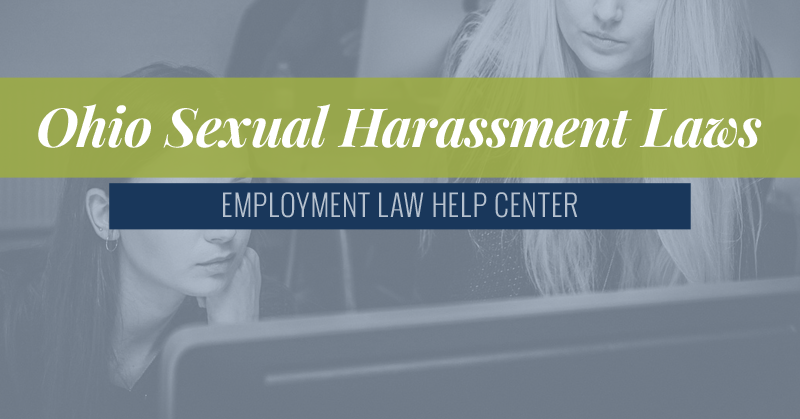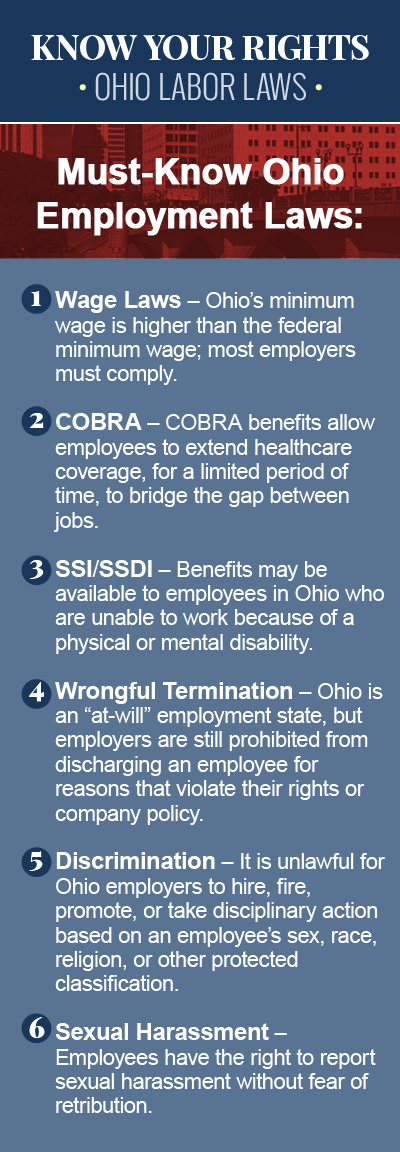Sexual Harassment
Discrimination in the workplace is against the law in Ohio, and one of the most common types of discrimination is sexual harassment, or unwanted advancements by an employer, coworker or another person in the workplace that are sexual in nature. If you have been the victim of sexual harassment at work in Ohio, you may have grounds to file a sexual harassment claim against the aggressor. Unfortunately, pursuing a sexual harassment claim in Ohio can be extremely challenging, as harassment in the workplace is sometimes subjective, and typically requires the expertise of a reputable sexual harassment attorney. Contact an experienced lawyer as soon as possible, if you believe you are being sexually harassed by your employer or another person at work.

Types of Sexual Harassment
In its simplest form, sexual harassment in the workplace consists of unwanted advancements by an employer, a coworker, or another person at work, and sometimes even occurs outside of work, such as at a holiday party for the office. Sexual harassment in the workplace can affect both male and female employees, and can be physical, such as unwanted touching or sexual advances, or verbal, such as sexist jokes or sexual comments. Some common types of sexual harassment include:
- Unlawful touching
- Sexual bribery
- Sexual coercion
- Sexist comments
- Sexual intimidation
- Sexual joking
- Requests for sexual favors
- Sexual advances

Recognizing Sexual Harassment in the Workplace
Federal law prohibits sexual harassment in the workplace, and there are protections in place for victims of sexual harassment, which may even include those who weren’t direct targets of the harassment, but who were adversely affected by the aggressor’s inappropriate behavior. In some cases, sexual harassment at work may come in the form of “quid pro quo” harassment, which occurs when an employer attempts to pressure an employee into entering a sexual relationship in order to earn a promotion, a pay raise, or another type of benefit at work. Quid pro quo harassment may also occur when an employee loses his or her job or promotion opportunity for rejecting sexual advances. Another common type of sexual harassment, called “hostile work environment” harassment, occurs when unwanted physical or verbal harassment interferes with an employee’s ability to do his or her job.
Title VII of the Civil Rights Act of 1964
Sexual harassment is a type of workplace discrimination that violates Title VII of the Civil Rights Act of 1964, a law that prohibits discrimination at work on the basis of race, color, sex, religion, age, gender or national origin. Unfortunately, harassment is often seen as subjective, and some people believe that certain employees actually invite sexual harassment in the workplace, which is why it’s important to be able to demonstrate a pattern of continued harassment, either by taking detailed notes about verbal harassment, or by collecting testimony from others who have witnessed instances of physical harassment. This documentation may prove to be useful later, as many people are uncomfortable testifying in sexual harassment cases, for fear of being retaliated against at work.
Pursuing a Sexual Harassment Claim in Ohio
Sexual harassment comes in many different shapes or forms, affects both men and women, and can create an offensive work environment for everyone involved, regardless of whether they themselves are being harassed, or are simply seeing it happen. If you believe you have been the victim of workplace sexual harassment in Ohio, file a claim with your employer as soon as possible, as having a report of the harassment on file can help your case, should you decide to pursue a lawsuit. Your next step should be to contact an experienced Ohio sexual harassment attorney to discuss the possibility of pursuing a sexual harassment lawsuit, which would penalize both the aggressor and your employer, for failing to prevent or put a stop to the harassment.




